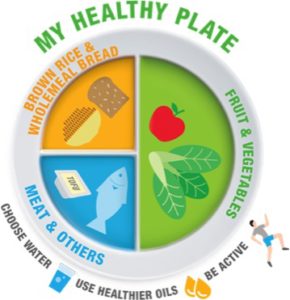Add MEANINGS to Life Everyday

Last month, I wrote about how one can come to terms with the diagnosis of dementia. 1 week ago, I was asked to present on ways to keep one’s brain active and ways to prevent dementia. And for that presentation, I created this acronym: MEANINGS. I thought that it will be meaningful and appropriate to share it with my readers here at dementiahelp.sg
Dinner conversation with my dearest on the evening before my presentation went like this:
He: “What is it again?”
I: “M-E-A-N-I-N-G-S, meanings. Add MEANINGS to your life…”
He: “Do you have evidence that MEANINGS really work?”
(My immediate response in my mind – not translated into action – ANNOYANCE as I don’t do or say things that are not evidence-based. But being a mindfulness practitioner, I do not typically act out of my emotions)
I: “Well, we don’t know what are the causes for many types of dementia, but we know for sure that vascular dementia is caused by the vascular diseases, and we know for many years now how to prevent vascular diseases or to live well with vascular diseases. And, there are 2 other things that we know for sure with regard to dementia. (1) The brain shrinks in people with dementia. (2) There are lesser brain activity for people with dementia. So voila, my acronym “MEANINGS” are not groundless, there are some evidence pointing to that.”
He: “How do you know that it will work?”
I: “If there are people willing to practise it together with me for a period of time, then I’ll know!”
He: “Then I should start practising that too, no?”
YES! Of course! And to all of my readers out there, if you want to practise my MEANINGS to prevent the onset of dementia or the deterioration of dementia, please email me and let me know so that we can start our own mini experiment – create a database of practitioner-subjects and see where that brings us to 😉
So, what does MEANINGS stand for?
M indfulness
E at healthy
A ctive
N ew thing
I dentify signs & symptoms of dementia & get checked
N ote down blood pressure (BP) readings
G o out & socialise
S leep well
I have been practising mindfulness since my teens, hence, my interest to know more about it. Mindfulness, an ancient Buddhism practice, has found its way into the western world in the 1970s; and since then many studies have been done about it, making it a science now rather than an ancient religious or spiritual practice. Mindfulness is a practice to relax and direct & strengthen your present moment focus & attention inwards, noting & watching – without judging – your breath, body sensations, feelings, & thoughts; as well as without the need to act upon them or change them. Brain scans had been done in a lot of studies to evaluate the positive effects from regular mindfulness practice. The findings proved that regular practice actually thickens a few parts of the brain including the hippocampus which was stated as being the first to shrink in people with dementia in Witchalls’ paper . Mindfulness practice is the first on my list as my logical deduction informed me that a thicker brain will then be a protective factor towards dementia even before my research for references for this article. And boy, was I right? I was very encouraged to find out that there are many papers supporting my hypothesis! So are you ready to practise mindfulness with me daily? I will share more about how to practise mindfulness in the upcoming articles.
Out of the eight above-mentioned strategies (MEANINGS), at least 3 of them address the prevention of vascular dementia. Do you know what are they? Yes, some of you were right. They are Eat healthy, Active, and Note down BP readings . Make sure you do them on daily basis to prevent the onset of or the deterioration of dementia 🙂
Eating healthily and being Active by incorporating physical activity and exercises in our life are strategies to prevent and / or to live well with vascular diseases. Healthy eating is something that most of us know well, to in corporate My Healthy Plate into our diet 3 times a day, in addition to eating less deep fried foods and salt.

Health Promotion Board advocates 150 minutes of exercise or more each week, with a combination of aerobics exercises (like brisk walking, running, swimming) and strength training such as lifting weights, using your body weight or using the resistance bands. for a start, click here and check this out. I will share more about how to eat healthily and on the various types of exercises that we can do both outdoor and at home in the upcoming articles.
To add on, being Active also helps to increase brain activity, so does Going out to socialise and doing at least 1 New thing everyday.
In fact, according to Dementia Australia (2016), the following are “activities that involve exercise for the brain, and have also been associated with reduced dementia risk as part of a mentally active lifestyle”:
- Reading. In particular, reading non-friction everyday provides you with new information and contents
- Listening to the radio. When you listen to the radio, instead of just hearing the radio, you are mostly likely to get to know at least a new song or the latest news.
- Visiting museums. Visiting museums require you to go out. And if you take a museum tour, you will get to meet and interact with people, at least the tour leader/guide. In addition, I always make new discovery (things that I have not seen before) when I visit the museums 🙂 Well, maybe I’m just a highly ignorant person 🙂
- Taking a course. We usually learn new things from a course. Now, if you are Singaporean, the Government had given you $500 in your SkillsFuture account for you to pay for your courses, which I’m sure some of you have yet to utilise that money.
- Learning a new language. Learning a new language is a great way to keep your brain active. I’m learning French. I have to remember new words and vocabs, new grammar rules, new pronunciation for certain familiar English words as the French pronounced them differently, and at times they even have a totally different meaning! For example, bra means the undergarment that woman wear to support her breasts in English but in French that same word means arm. See, it’s same same but different.
 Source of picture: https://www.youtube.com/watch?v=43ZYEY2CCYs
Source of picture: https://www.youtube.com/watch?v=43ZYEY2CCYs - Playing musical instruments. Similar to learning a new language, playing musical instruments or learning to play one is a great way to keep your brain active as you will have to either remember the music notes and recall them as you play or you will have to read the music notes, decipher them real-time and translate that onto a certain part of your instrument. So never mind if you are unable to sing well, consider playing a guitar or a simpler version – the ukulele.
- Artistic and other hobbies. As you create art, you create something new each time, it’s never 100% the same as the previous ones. And creating something requires a lot of brain activity, just like now… I can feel that my brain is really active, even though it’s 11.42pm! That’s the power of the creation process!
- Participation in leisure activities such as sports, hobbies, dancing, gardening, groups, cultural activities and conversation. Participation in such leisure activities usually creates the opportunities for you to go out, meet people and socialise, and some of these activities like dancing, gardening and sports also require you to be active. Hence, I must say that this stone can kill more than two birds! ;P In addition, I encourage you to find out more and go deeper into that area, for example when you do gardening, you will inevitably gain deeper knowledge about the soil, the seeds, the germination process and factors, etc. Wow, isn’t that plentiful to keep your brain active?
- Board games. Playing board games, most often than not, requires you to play with other players – that’s socialising for you! It also at times requires you to change your play strategy to win, hence, that’s doing new thing.
- Crosswords, Sudoku and other puzzles. This is quite obvious that these do increase brain activity.
Hence, we can see that doing 1 new thing a day does not mean that we have to find new things to do everyday… cos I know that some of you will say to me that you will soon run out of new things to do plus having to incur additional expenses. From my illustrations above, you can see that it can be just changing the way that we have been doing things, even changing the route that we’ve always been taking to go from Point A to Point B, being curious to uncover about our world (in your own way) every day, dig deeper into our knowledge about our world, people around us, things that we enjoy doing. Don’t just do things for doing things sake, pay attention to the things that you are doing and try to do it differently.
According to Dementia Australia (2016), it is possible for people with early stage dementia to engage in the 10 above-listed activities. For people in the later stages of dementia, such activities will need to be simplified and to relate to their personal interests and existing capabilities such as:
- Doing simple calculations
- Reading aloud from books
- Storytelling, including brief stories and role playing in longer stories, to help increase attention and participation and to stimulate emotions and memories
- Imagery exercises to stimulate the senses, such as recalling a peaceful nature scene
- Dancing
- Playing musical instruments
- Listening to music
It is common knowledge that early detection means better prognosis. Hence, it is important for you to be able to Identify the early signs and symptoms of dementia and get it checked to determine if ‘your increasingly forgetfulness’ is actually caused by dementia. Click here for the signs and symptoms of dementia.
Lastly, Sleep well. According to Kate Swaffer, who was diagnosed with dementia about 10 years ago, getting a good night sleep and meditation have been helping her all these years since her diagnosis such that she was able to complete her Masters degree, wrote 3 books and is doing her PhD degree now. If a good night sleep has been helping her all these years, it must be helpful in the dementia prevention and prevention of its deterioration to a certain degree. Our brain needs sleep to repair itself, hence, make sure that you are getting sufficient sleep. You may ask how many hours of sleep do you need. Well, sure, it does differ from person to person. But one definite symptom of insufficient sleep is daytime sleepiness, such as the post-meal “carbo-concussion” that some referred to. Another way to ensure that you are getting sufficient sleep is to wake up without an alarm clock, allow your body to naturally awaken itself. Haha… are you kidding me, Susan? That means that I’ll be late for work /school everyday. No, I’m not pulling your legs at all. If you need an alarm clock to wake you everyday, it may just mean that you will need to adjust your bedtime and sleep earlier everyday so that you are able to wake up naturally and be in time to make it to work/school without being late. It will take you a while to determine how many hours of sleep you need as an individual. And yes, this amount may differ between you and your spouse/ partner, or people whom you share bed with. Unable to fall asleep before a certain time? Try practising the mindful breathing. Some of my participants shared with me that they became so relaxed that they actually fell asleep while practising the mindful breathing that I asked them to. Some even shared that they have not slept so well for years! So, do keep a lookout for my upcoming article on mindfulness.
References:
- Dementia Australia. (2016). Mental exercise and dementia https://www.dementia.org.au/files/helpsheets/Helpsheet-DementiaQandA06-MentalExercise_english.pdf accessed on 3 Jun 2018
- Witchalls,C. (2015). Size of These Brain Parts Tied to Dementia Risk https://www.webmd.com/alzheimers/news/20151015/hippocampus-dementia-brain#1 accessed on 3 Jun 2018
-
Whitwell, J. L. (2010) The protective role of brain size in Alzheimer disease https://www.ncbi.nlm.nih.gov/pmc/articles/PMC3920660/
- Alzheimers Research UK. (2016). Size of the brain’s memory centre indicates risk of dementia with Lewy bodieshttps://www.alzheimersresearchuk.org/size-brains-memory-centre-indicates-risk-dementia-lewy-bodies/